| Article ID | Journal | Published Year | Pages | File Type |
|---|---|---|---|---|
| 1757788 | Journal of Natural Gas Science and Engineering | 2015 | 7 Pages |
•An experimental work on coal damage due to liquid nitrogen super-cooling was presented.•The coal damage characteristics caused by liquid nitrogen cooling were analyzed.•The significance of cryogenic damage of coal for coal bed methane fracturing was discussed.
The most distinct feature of liquid nitrogen fracturing is the sharp reduction in temperature around the rock when liquid nitrogen comes in contact with the reservoir. This condition induces thermal stress inside rocks, which then become damaged. To investigate the effect of liquid nitrogen super-cooling on coal damage, permeability tests were conducted on the same coal samples before and after cooling. Meanwhile, uniaxial compression tests were performed on intact and cool-treated coal samples. Experimental results showed that liquid nitrogen super-cooling not only induces thermal cracks on coal surface, but also causes coal cracking along macro-fractures on the surface of samples. Coal permeability was increased by 48.89%–93.55% because of liquid nitrogen super-cooling. The compressive strength of cool-treated coal samples decreased by 16.18%–33.74% compared with intact samples, and the former presented more obvious brittle failure characteristics. In the uniaxial compression tests, the numbers of points in which stress induced a sharp decrease in the stress–strain curves of cool-treated samples were more than those in the intact samples, which indicates enhanced micro-fracturing in the cool-treated samples. Thus, we can conclude that liquid nitrogen super-cooling may cause coal damage and fracture failure, consequently promoting the formation of fracture networks and improving stimulation performance because of the generation of thermal fractures.
